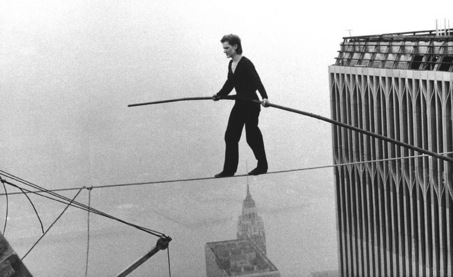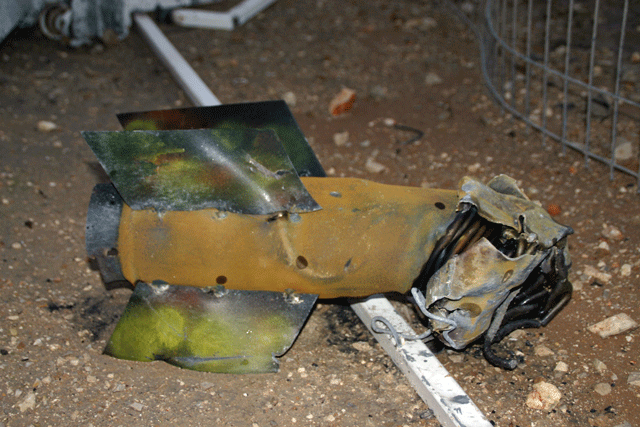January 10, 2009
Emphasis Mine

This edition to Emphasis Mine is devoted to Israel. I think all good intentioned people in our world want and need Israel to survive and prosper. Israel is the model not only for us, we denizens of Western civilization but also for those cultures who are struggling to shed their tribalist past and enter the modern world, one so premised unconditionally on freedom. The Jews have figured out how to maintain the integrity of their tribe, their glue of family, within the solvent of individualistic modernity, the key driver of civilization. This is the locus of anxiety of all atavistic cultures: how can the family survive in a world that is so resolutely individualistic? So if one cares about the survival of non-western legacy cultures, a.k.a. Thomas Barnett's "the Gap" (see Item #2 here), then the hardest lesson will be that Israel is the role model for keeping the integrity of their glue whilst floating in a sea of solvent.
Politics in art is a tricky subject in part because artists are shallowly prepared to engage in it, because the course of recent history has been so complicated, because political discourse is riven with dissemblance; because artists are inherently vulnerable economically and we reflexively reach for the helping hand regardless who extends it, because the occupational hazards of an artist include narcissism and infantilization, because the majority of the political dialog in the art world and academia is one sided (read: the Left side) and there exists no real tolerance of alternate points of view, (cue the soundtrack of the Wizard of Oz: "because, because, because, because, because!"...)
As I have posted here before: I possess two wings, both right and left. People on the hard left tend to think I am on the right, people on the hard right tend to think I am on the left. I prefer to be balanced as perfectly as humanly possible on the center. Regarding Andrew Breitbart's recent warning: "If conservatives don't figure out popular culture soon, the movement will die a deserving death.", this notion might be true in reverse: "If popular culture doesn't figure out conservatives soon, the avant garde will die a deserving death."
A good start: here.. (Call me a Constitutional Moderate.) If "...without the law, there can be no freedom...", then the rebel yell has a debt to pay to the system he is breaking with. The tension that enables the bungee jumper to leap into the void is the elastic yet rooted sanction of freedom that allows us to fling ourselves into the void, that field of dreams, that place in the human imagination sometimes called utopia.
This is the reason why I keep drawing and then walking the line between the left and right: because that's where civic life right now... including the shape of our art world dialog... seems to be the most challenging.

A protest over the fatal shooting by a BART police officer of an unarmed black man mushroomed into several hours of violence Wednesday night as demonstrators smashed storefronts and cars, set several cars ablaze and blocked streets in downtown Oakland.Well worth a slow and careful read of the ellipsis.The roving mob expressed fury at police and frustration over society's racial injustice. Yet the demonstrators were often indiscriminate, frequently targeting the businesses and prized possessions of people of color.
They smashed a hair salon, a pharmacy and several restaurants. Police in riot gear tried to control the crowd, but some people retreated along 14th Street and bashed cars along the way.
The mob smashed the windows at Creative African Braids on 14th Street, and a woman walked out of the shop holding a baby in her arms.
"This is our business," shouted Leemu Topka, the black owner of the salon she started four years ago. "This is our shop. This is what you call a protest?"...
...Soo Jung Sung, an Asian American, didn't understand why she was to blame. She wept as she looked at the shattered front windshield of her Nissan Montero.
"Emotionally, I totally understand them," she said of the upset over Grant's shooting. "But it's not nice."
2. (I don't know who produced this video, but I think it acquits itself in terms of veracity. There are others like it, evidence of repression and media manipulation abound for those who have eyes to see.)
I can't understand how anyone of us in our civilized world would not support Israel's current effort in Gaza. Hamas has been abandoned by the West Bank, the various powers that be in the Arab world even to the extent of Iran, tacitly giving license for Israel to do what it wants, what it needs to do to project force onto Hamas. Hamas' only support is coming from a significant segment of the intelligencia in our civilized world. Is this a case of the "enemy of our enemy is our friend"? If so, why exactly have some of us made an enemy of civilization, of ourselves, in our pique of alienation? Does the expression of feeling have no limit? Has feeling become so decoupled from the objective world of fact that consequences of action no longer matter? Do we care about the welfare of those who dissent, trapped as they are within atavistic cultures? They are people like us, we happy (and sometimes unhappy) denizens of the civilized world, but it is they who are trapped within legacy cultures and societies, all matriculating at various rates into modernity (another word for civilization).
What about them?
Here's Frum lauding Shrum for a point of agreement that all members of civilized society should assent to. Item four is particularly interesting:"Fourth, Democratic attitudes are poisoned by the influence of an anti-Zionist hard left, a vociferous faction whose ideology can bleed into outright anti-Semitism."
The art world as we know it cannot survive for long in the sphere of the hard left. Art and the hard left (or the hard right, for that matter) are antithetical to the extreme. So why is it that we tend to experience a frisson of excitement when artist decides to transgress in the political realm? Doesn't frisson have its' price? Here''s a shot at an answer: I accept the precept that transgression is the principal mode of Western art in the civilized world. But what happens when the sum total of the history of artistic transgression keeps adding up to a big "Meh."? Every time history is shattered, it's time to break it again. Ad nauseam. So what conclusion did some of us come to? To shatter the shattering with nihilism. It seems that some of us have come to the conclusion that the only way out is to bring the temple down upon us. It's Sympathy for the Devil with the artifice dropped out. Another name for the demise of art. Some of us, many of us in our art world have forgotten the purpose of the MacGuffin: that the plot device is merely instrumental and therefore secondary -to the degree of being disposable- in the service of the experience in the dramatic arts...
When she came to write about Rahel?s life, then, Arendt brought to it a passion and a personal commitment born of her own experience. No one could have believed more seriously than Rahel in the cultivation of the spirit. Yet to Arendt she appears as merely the victim of a terrible illusion??the hapless human being, the shlemihl, who has anticipated nothing.? The lesson that Arendt drew was that a beautiful soul is not enough, for ?it was precisely the soul for which life showed no consideration.? To live fully and securely, every human being needs what Arendt calls ?specificity,? the social and political status that comes with full membership in a community. Arendt had said of herself, in the ?Shadows? letter, that ?she did not belong to anything, anywhere, ever?; so, too, Rahel was ?exiled . . . all alone to a place where nothing could reach her, where she was cut off from all human things, from everything that men have the right to claim.? Avoiding that helpless ?place? became the goal of Arendt?s life and thought. The categorical imperative of her political theory might be phrased: Thou shalt not be a shlemihl.Well worth reading, to the very end:
Yet the supreme value that Arendt places on individual pride and aristocratic distance, on intellect and excellence, also sharply restricts the human understanding that must be the basis for any confrontation with political evil, especially the evil of the Holocaust. Too much of life and too many kinds of people are excluded from Arendt?s sympathy, which she could freely give only to those as strong as she was. If, as she wrote, ?it is the desire to excel which makes men love the world,? then our love for the world actually makes it harder for us to love the people who inhabit it. This is the dilemma that runs through all Arendt?s writing, demonstrating that what she observed about Marx is true of her as well: ?Such fundamental and flagrant contradictions rarely occur in second-rate writers; in the work of the great authors they lead into the very center of their work.?
4. I think that the movie The Battle of Algiers is amazing, mesmerizing, yet problematic. Robert j. Avrech writing in Breitbart's brand new Big Hollywood, puts words to my apprehension:
End Interpolation: Now You Know, There are Worlds Within WorldsThe leaders of the Algerian revolt kept telling one another and their cadres to have patience. Democracies, they lectured their followers, cannot stand long wars; democracies have a built-in weakness: elections. And wars are bad for elections. Democracies demand immediate results.
?We can hang on forever,? Ahmed Ben Bella explained to his men, ?we can fight and fight, whereas democracies like France have to go to their citizens and explain why their men are dying. And sooner or later, they will grow sick of it. Democracies are inherently weak for they have no patience.?
This theme rises again and again in Horne?s amazing book, and though the French fought in Algieria for eight long and bloody years, Ben Bella was right. In fact, the Battle of Algiers almost brought revolution to the streets of France, and mutiny in the French army.
Now, let?s be clear, the current wars in Iraq/Afghanistan and a dozen other shores where the Islamists sow their bloody work, are not colonial wars. The French had a million citizens in Algeria living as privileged subjects. The wars in Iraq/Afghanistan, etc., are wars of liberation against fanatical, sharia-yearning terrorists who are part of a worldwide caliphite pansurgency. The war in Iraq was a war to overthrow one of the worst dictators this planet has ever seen. Plus: Saddam Hussein was actively supporting Mideast terror. Let?s not forget that he was paying $25,000 to the families of Palestinian suicide bombers.
But the idea about the lack of patience in democracies is lodged in my cortex like a steel spike. Everywhere I go I hear people lamenting: ?How long is this war going to take?? As if they are standing in line at MacDonald?s.
Perhaps we are too used to instant solutions in our lives.
And the Islamic terrorists know it.
They count on it.
This article introduced me to Carlos Marighela. There's not much on him in Wikipedia, but there a great link to his Minimanual of the Urban Guerilla. Fascinating reading.
More links here, here, here...
5.

It's worth your time to click on the link and find the larger image of the remains of the spent Qassam rocket pictured here. Note the fins rough cut out of sheet metal, tack welded three spots each, spray painted with what looks like the dregs of Krylon?; the rusted pipe of the rocket body, something that looks like recycled copper coils... it's like a prison improvised shiv. Some of us in our art world might have sympathy for the downtrodden, a noble intention. But Gaza had autonomy to the extent that Israel left the territory (but not to the extent that they could import weapons to fulfill their mandate to eliminate Israel, does this not make sense?). Human shields. Why are many of us complacent about this? If this is what they do when they have no access to Iranian munitions, what will they do if we shrug and let them go about their business?
Only Israel attracts an intellectually respectable movement querying its very existence. For the purposes of comparison, let's take a state that came into existence at the exact same time as the Zionist Entity, and involved far bloodier population displacements. I happen to think the creation of Pakistan was the greatest failure of post-war British imperial policy. But the fact is that Pakistan exists, and if I were to launch a movement of anti-Pakism it would get pretty short shrift.Posted by Dennis at January 10, 2009 1:06 PM
But, even allowing for that, what has a schoolgirl in Villiers-le-Bel to do with Israeli government policy? Just weeks ago, terrorists attacked Mumbai, seized hostages, tortured them, killed them, and mutilated their bodies. The police intercepts of the phone conversations between the terrorists and their controllers make for lively reading:"Pakistan caller 1: 'Kill all hostages, except the two Muslims. Keep your phone switched on so that we can hear the gunfire.'
"Kill all hostages, except the two Muslims." Tough for those Singaporean women. Yet no mosques in Singapore have been attacked. The large Hindu populations in London, Toronto and Fort Lauderdale have not shouted "Muslims must die!" or firebombed Halal butchers or attacked hijab-clad schoolgirls. CAIR and other Muslim lobby groups' eternal bleating about "Islamophobia" is in inverse proportion to any examples of it. Meanwhile, "moderate Muslims" in London warn the government: "I'm a peaceful fellow myself, but I can't speak for my excitable friends. Nice little G7 advanced Western democracy you got here. Shame if anything were to happen to it."
"Mumbai terrorist 2: 'We have three foreigners, including women. From Singapore and China'
"Pakistan caller 1: 'Kill them.'
"(Voices of gunmen can be heard directing hostages to stand in a line, and telling two Muslims to stand aside. Sound of gunfire. Sound of cheering voices.)"
Leave a comment